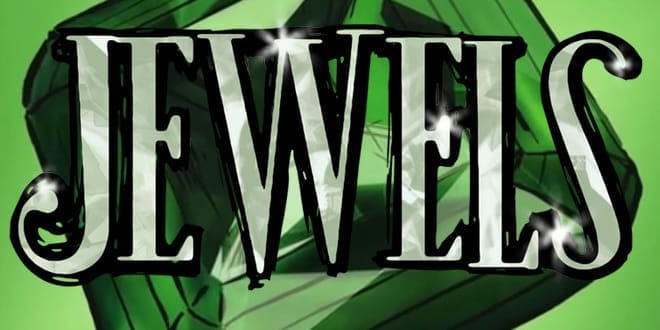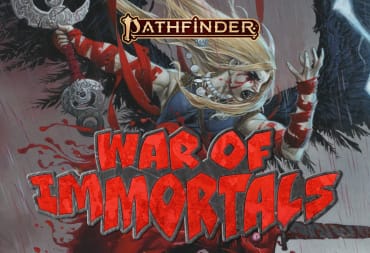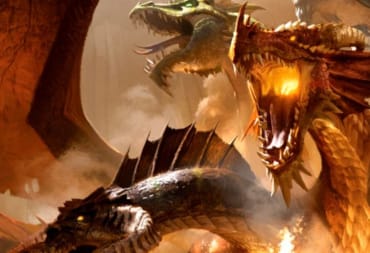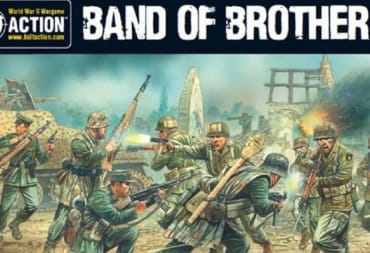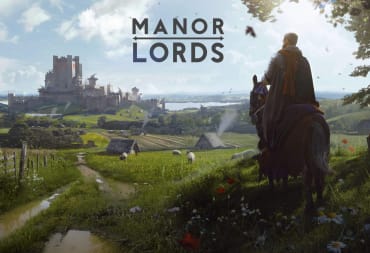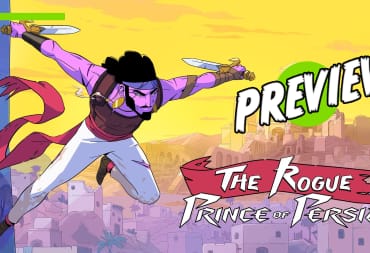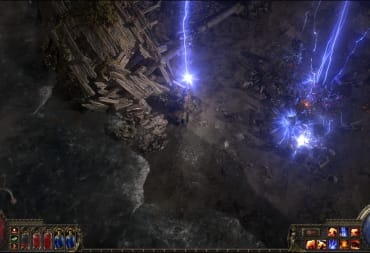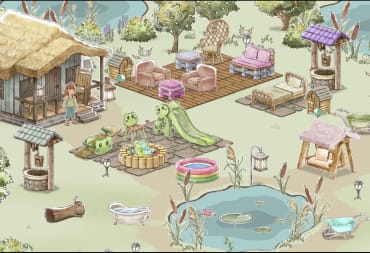Jewels is a game by E9solutions Ltd for 2-5 players where you're acting as, well, jewelers. You'll travel between one of seven different cities, collect raw resources, craft jewelry, and try to sell it. The winner of the game is the person who has the most net worth between their cash on hand and their unsold assets.
When you set up a game of Jewels, you won't really need very much beyond some table space for the table cards in the "Cities" as well as the crafted and unsold Gems and Jewels of the players. The game has three types of cards used in gameplay—aside from "Reminder" cards that tell you how to go through a turn. Resource cards are gems and gold that are used to craft jewelry. Encounter cards are effectively NPCs that populate the Cities and determine how you interact with those Cities. Event cards bring changes to the rules of the game temporarily—sometimes for the entire round. For example, the King's Birthday card will add 2¢ to every merchant currently in play and that's it. The Snowstorm card, however, prevents players from using the Travel action for the entire round and traps them in the cities where they're currently located.
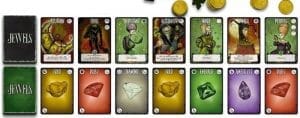
Setup is a breeze and doesn't take very long to get through. An eight-sided die is rolled to determine who goes first and you place a "Turn Counter" marker in front of the first player. The position of the first player rotates clockwise after every round. Next, you shuffle the three decks of cards. The players are dealt three Resource cards to comprise their hand. You then deal out seven Encounter cards in a row on the table and follow that by dealing seven Resource cards in a row below those. These seven "columns" (shown right) serve as the "cities" of the game where players will station themselves. Players then pick and place their characters at one of the seven cities. Everyone receives 25¢ in currency at a minimum. The second, third, and fourth players receive a bonus of 1¢, 2¢, 3¢, etc. as a balancing mechanic to offset their later starting position. Finally, any special effects present on the initial showing of Event cards takes effect—such as the Leprechaun card, which gives every player an additional card at the start of the round. The game can now begin.
Players can take three actions per turn out of a total of six action choices. They can travel to another City, buy a Resource in the city, craft a Jewel or refine a Gem, interact with an Encounter (such as by selling something to a Merchant), refill the City's cards, or take 1¢.
Ideally, players will attempt to purchase Resources in order to craft Jewels, such as Bracelets, Rings, or Necklaces. Jewels are combos of certain cards that consist of at least 1 Gold and multiple Gems. More difficult combinations have better rewards. A Bracelet comprised of one Gold and two pairs of like gems (such as two Rubies and two Sapphires) will give you a 5¢ bonus. A Bracelet made from one Gold and four of the same gem will result in a 15¢ bonus. The ultimate value of a Jewel is the total cost of all its components plus any applicable bonuses.
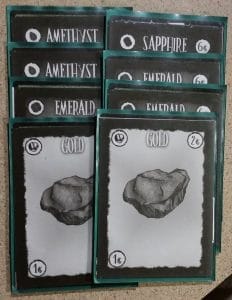
After everyone has taken their turn, the round concludes. The Turn Counter is passed clockwise. This player rolls an eight-sided die. Landing on 1-7 will cause the contents of that City to be discarded and replaced with new cards. If an 8 is rolled or the number rolled corresponds to an empty city, an Event card is played and resolved. 1¢ is placed on each Merchant that's on the board. Finally, the Encounter and Resource cards are refilled and any special effects triggered by newly placed Encounter cards are resolved.
Jewels continues in this fashion until there aren't enough cards to refill every City, whether it's Resource or Encounter cards. A final round then takes place. At the conclusion of the final round, players add up their currency and get half of the value of their unsold crafted goods, such as Jewels or refined Gems. The player with the most money at the end of the game wins. A full game of Jewels will take around 45-60 minutes.
My tabletop group played around a dozen games of Jewels over several weeks. We encountered no major problems other than one or two minor rule clarifications, which were helpfully provided by the developer. We had a good bit of fun and largely enjoyed our experiences.
There's a good balance between risk and reward. The higher-end versions of Rings, Bracelets, and Necklaces require multiple types of the same Gem but there's only so many in the deck. We only saw one person manage to acquire two Gold and five Sapphires to make the highest scoring Necklace that provides a 30¢ bonus. The gems themselves have different values as well. Amethysts are bought for 1¢ and sold for 3¢ on their own and there's ten of them in the deck. Diamonds are bought for 2¢ and sell for 8¢ and there's only five of them in the deck. Making the best Necklace out of Diamonds would be the most valuable piece of jewelry you could create, but you would have to get your hands on every single Diamond in the deck to do it.
Completing combos to craft jewelry is arguably the core component of the game. However, RNG can be a fickle mistress and some players might not have the cards needed to do it. Jewels provides several outs for people in these situations. At the bare minimum, you can simply earn 1¢ as one of your actions if there's nothing better to do. Players can also just outright craft Gems into Refined Gems. This usually excludes their potential for being used in a crafted Jewelry, but any cards in your hand at the end of the game do not count for your final score so you may as well put them down.
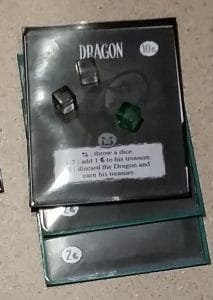
There's also a nice variety of Encounter cards that ensure no two games are the same. Merchants do not always purchase the same things. A particular Merchant might only be interested in buying Rubies. Another might only buy Rings. Yet another might purchase Bracelets and Necklaces but no Rings. The mechanics of Jewels can often see your best-laid plans go to waste when a die roll or an event such as the Plague card, which removes all Encounters on the board, comes into play. We were often not certain who was going to win the game until its conclusion, and the players' scores were usually pretty close to one another. I take these things as indicators of a well-balanced game.
One particular type of Encounter card that is worth mentioning is Monsters. Merchants buy stuff and Mercenaries affect the game board, but Monsters are a different beast altogether. They often come onto the board with a certain amount of money as a prize. They also hold onto any Resources in their City and prevent you from purchasing them. Successive rounds will add to the monster's hoard, and we've had one or two games decided by a player getting lucky with defeating the Monster through a die roll. Rolling the die is not without risk, of course; if you fail the roll, you'll have to add 1¢ of your own money to the monster's hoard.
The cards and mechanics in Jewels give you a lot of opportunities to win the game in different ways. You'll have to adapt your strategy to the cards you begin with and the circumstances of the board, but every single game we've played has ended up being a pretty close finish.
Ultimately, I think Jewels manages to be an easy enough game to pick up that will provide you a good variety of play with relatively few moving parts. My tabletop group used a Print & Play version of the game so I can't comment on the quality of the finished product's materials. That said, I think Jewels would be a worthwhile game to look into if you're looking for something new to play that doesn't take forever to set up.
Jewels had a successfully-funded Kickstarter, which is currently going through its fulfillment. Unfortunately, it appears to have been delayed and the game is not yet available for purchase anywhere outside of Italy through a particular card shop. I genuinely hope that this game comes to market in the wider world because I've certainly had a good time with it.
The Print & Play version of Jewels used for review was provided by E9 Solutions.
What do you think of Jewels? Does it sound like the sort of game you'd be interested in playing? What other similar styles of game do you enjoy? Let us know in the comments below!
Previews you can trust: To ensure you're getting a fair, accurate, and informed review, our experienced team spends a significant amount of time on everything we preview. Read more about how we review games and products.
Have a tip, or want to point out something we missed? Leave a Comment or e-mail us at tips@techraptor.net
